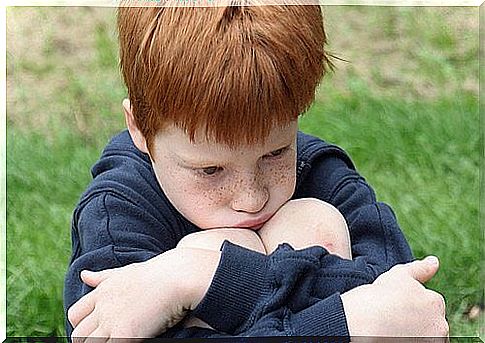How Can We Help A Shy Child?

A shy child is one who is characterized by being withdrawn and introverted. When it comes to interacting with other people, they feel uncomfortable and, therefore, avoid socializing and tend to establish few relationships. In other words, they are confined to their comfort zone because they feel intimidated for some reason.
Shyness is present in 15% of children under 6 years of age. Shyness can emerge in the baby from the first year, just when he perceives a certain separation from his parents. Around the age of three, he must face a new event: the beginning of the school term.

Although, in adolescence, shyness can be even greater. An investigation published in “Pedriatrics” states that 46.7% of adolescents between the ages of 13 and 18 consider themselves shy, with a stronger trend in young women.
Characteristics of a shy child
- The child has problems when interacting with children of the same age. It is difficult for him to maintain and, especially, comment on a conversation. On the contrary, it is very distant.
- In class he does not participate. Not because the answer is not known, but because he is filled with the shame of making a mistake and letting others realize it.
- Avoid games and activities suggested by your classmates. At recess time, in the park at sports activities or at school.
- Presents fear of rejection and anxiety in certain situations such as speaking in public, reading aloud or going to the blackboard.
- Psychophysiological signs. These that are activated in a situation that causes extreme shyness, such as sweating, redness, nausea and palpitations.
- I try to avoid strangers. They are fearful and suspicious.
- They prefer to be alone rather than join a group.
How to help a shy child?
- Don’t force him into new situations until he’s comfortable and confident enough. The reaction of some parents is to insist that he be open and press him for something that he does not really want to do.
- Give him new challenges, but without being overwhelmed, since the child has his own learning rhythm and it must be respected.
- Don’t ridicule him or make him feel different from the rest. Normalize the situations that cause fear and explain everything in detail so that he can feel more confident.
- Support him unconditionally and trust who he is. The child must feel supported and loved by his parents, who appreciate who he is.
- Help him cope but avoid being overprotective.
- Don’t tag him. It is dangerous. It is not highly recommended to use the typical “he is very shy”. The best thing is to show normality and try to relax him.
- Set the example. Sociable parents, sociable children. If children observe that their parents have a sociable attitude to new circumstances, they will learn and assume that this is natural.
- Compliment her when she gets it right. A small gesture goes a long way to a shy child. Therefore, it is important to value it, which will help them gain self-confidence.
Is the shy child born or made?
A shy child is made, even when there may be certain predispositions (such as a physical difficulty). The type of education that children receive and their immediate environment are part of the origin of shyness. Excessive rigidity, criticism and disapproval from parents influence the development of insecurity.

On the other hand, when there are no or few opportunities to socialize, a shy child has no opportunity to improve his social skills and overcome his insecurity. Also, when a child is poorly participatory, he needs to be taught to interact until he achieves the fluency he needs to feel comfortable.
Shyness can be overcome. No pressure or scolding. It’s all about guiding the child little by little through different situations and characters. It is important to talk and create a strong bond so that the child can feel calm and gain more and more confidence in himself.










